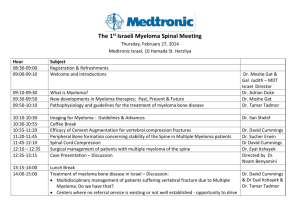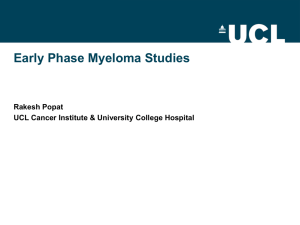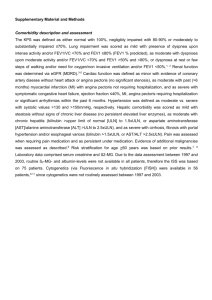VMP Jan 13_Layout 1
advertisement
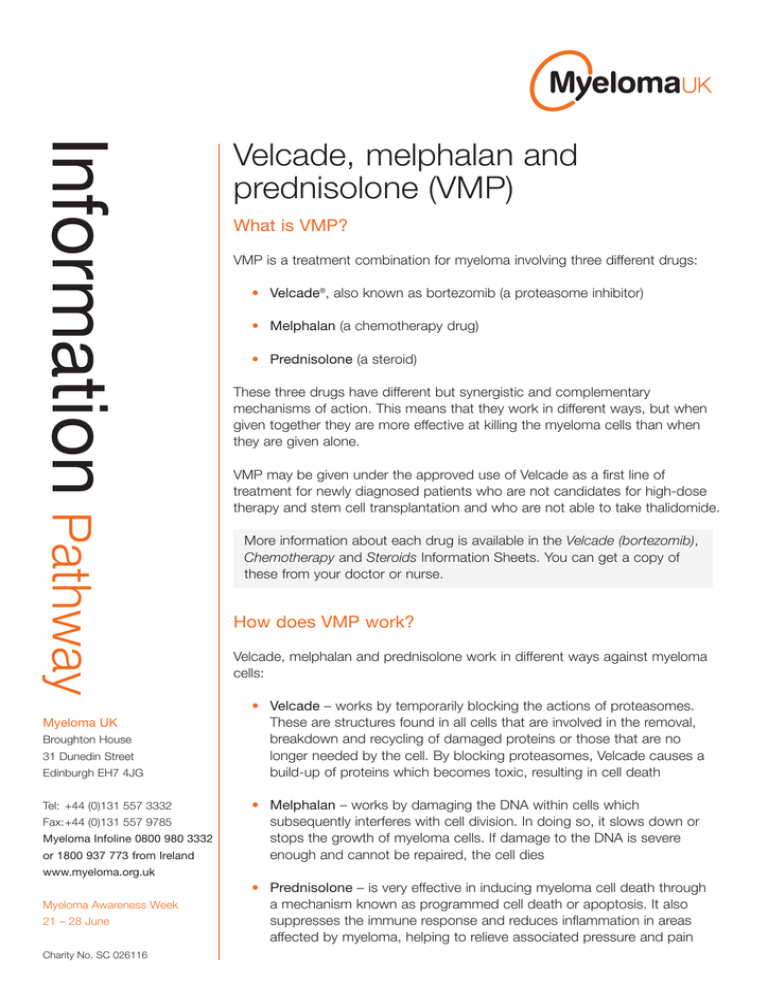
Information Pathway Myeloma UK Broughton House 31 Dunedin Street Edinburgh EH7 4JG Tel: +44 (0)131 557 3332 Fax:+44 (0)131 557 9785 Myeloma Infoline 0800 980 3332 or 1800 937 773 from Ireland Velcade, melphalan and prednisolone (VMP) What is VMP? VMP is a treatment combination for myeloma involving three different drugs: • Velcade®, also known as bortezomib (a proteasome inhibitor) • Melphalan (a chemotherapy drug) • Prednisolone (a steroid) These three drugs have different but synergistic and complementary mechanisms of action. This means that they work in different ways, but when given together they are more effective at killing the myeloma cells than when they are given alone. VMP may be given under the approved use of Velcade as a first line of treatment for newly diagnosed patients who are not candidates for high-dose therapy and stem cell transplantation and who are not able to take thalidomide. More information about each drug is available in the Velcade (bortezomib), Chemotherapy and Steroids Information Sheets. You can get a copy of these from your doctor or nurse. How does VMP work? Velcade, melphalan and prednisolone work in different ways against myeloma cells: • Velcade – works by temporarily blocking the actions of proteasomes. These are structures found in all cells that are involved in the removal, breakdown and recycling of damaged proteins or those that are no longer needed by the cell. By blocking proteasomes, Velcade causes a build-up of proteins which becomes toxic, resulting in cell death • Melphalan – works by damaging the DNA within cells which subsequently interferes with cell division. In doing so, it slows down or stops the growth of myeloma cells. If damage to the DNA is severe enough and cannot be repaired, the cell dies www.myeloma.org.uk Myeloma Awareness Week 21 – 28 June Charity No. SC 026116 • Prednisolone – is very effective in inducing myeloma cell death through a mechanism known as programmed cell death or apoptosis. It also suppresses the immune response and reduces inflammation in areas affected by myeloma, helping to relieve associated pressure and pain As each of the drugs work by killing myeloma cells in different ways, the treatment combination of VMP is much more effective at killing a greater number of myeloma cells than each of the drugs on its own. This is the main reason why treatment combinations are used in myeloma. How is VMP given? VMP treatment is given in different ways. Velcade is given intravenously (into the vein) or subcutaneously (into the skin) while melphalan and prednisolone are given orally (tablet form). The exact dose, duration and frequency of each of the drugs depend on a number of factors and may vary from patient to patient. Velcade is always administered in the hospital but you will be prescribed melphalan and predisolone tablets and be given advice on how and when to take them. Table 1 outlines the type of information you may be given in relation to taking melphalan and prednisolone. Melphalan Prednisolone The tablets should be swallowed whole with water The tablets should be swallowed whole Take melphalan on an empty stomach Take prednisolone in the morning with food to help protect the lining of the stomach If you suffer from indigestion or gastric irritation you can take it with food You may also be prescribed an antacid to reduce the risk of gastric irritation The tablets should be kept in the fridge Several tablets may have to be taken at one time Table 1: Information for taking melphalan and prednisolone What response can I expect from VMP treatment? As with all treatments for myeloma, it is difficult to predict exactly how you might respond to VMP treatment. Response to treatment depends on a number of factors including the individual nature of your myeloma, the number and type of your previous treatments and any side-effects you have. It is possible, however, from looking at clinical experience and data from clinical studies, to get an indication of how well patients on VMP treatment might respond. Studies have been performed that demonstrate the benefit of VMP as first-line treatment for myeloma patients. In a clinical study, the combination of VMP was associated with overall response rates (partial or complete response) of over 70%. How will I know if VMP treatment has worked? To find out how well you respond to VMP treatment, several tests will be carried out on a regular basis. These tests may vary from patient to patient but generally include routine blood and urine tests and possibly occasional X-rays or scans. In some cases, you may be required to undergo a bone marrow biopsy at the end of your course of treatment. Signs that your VMP treatment is working include: • A fall in the paraprotein level in your blood/urine • An improvement in the symptoms and complications of myeloma Information Pathway Velcade, melphalan and prednisolone (VMP) 2 • A general improvement in overall health and quality of life What are the potential side-effects of VMP? As with all drugs, the combination VMP has a number of potential side-effects. They vary considerably from patient to patient and may be mild or more serious. As side-effects can usually be treated or managed, it is important to highlight them promptly to your doctor or nurse. The earlier they are alerted, the sooner they can help minimise the potential consequences of treatment-related side-effects. Common side-effects of VMP treatment and ways they may be managed are outlined below. Peripheral neuropathy: Peripheral neuropathy is the term used to describe damage to the nerves of the peripheral parts of the body such as the hands, feet, arms and legs, and is a recognised potential side-effect of Velcade. Symptoms include numbness, tingling, increased sensitivity and pain. It is very important to tell your doctor or nurse if you have any of these symptoms as soon as possible to reduce the risk of permanent damage. While switching to subcutaneous injections of Velcade may lower the severity of the peripheral neuropathy, a small number of patients will still have problems. In such cases, the dose of Velcade may be reduced or treatment may need to be stopped temporarily. Low blood counts: Velcade can suppress the ability of the bone marrow to produce blood cells. It is therefore quite common for your blood counts (red and white blood cells and platelets) to be lower than normal during treatment. The most likely type of blood cell to be affected by Velcade is a reduction in platelets (thrombocytopenia). This can lead to an increased risk of bruising and bleeding. If your platelet counts become too low you may be given a platelet transfusion. A low red blood cell count can cause anaemia and fatigue for which you may need a blood transfusion, or receive other drugs e.g. erythropoietin, to help boost your red cell count. A low white cell count may make you more susceptible to infection and if it becomes too low you may be given a drug called granulocyte-colony stimulating factor to increase your white blood cell count. Nausea, vomiting and appetite loss: Melphalan may occasionally cause you to feel sick (nausea) or actually be sick (vomiting). Your doctor can prescribe anti-sickness drugs (anti-emetics) which you should take regularly as advised to prevent any sickness. It is important you keep drinking to avoid dehydration, especially if you have been vomiting. If vomiting is prolonged and you are unable to keep anything down, you should contact your doctor for advice. If your appetite is poor, you may find that eating small amounts regularly throughout the day instead of two or three large meals a day, helps. You may also benefit from taking nutritional supplements to ensure that you are still receiving all the essential vitamins and minerals you need. Your doctor or nurse will be able to refer you to a dietician if you think this would help. Gastrointestinal effects: Velcade can cause diarrhoea or constipation. Whilst usually mild to moderate and easily manageable, these side-effects can be more problematic in some cases. It is important to ensure good fluid intake and maintain a balanced diet. Your doctor may prescribe medication to help prevent or control your symptoms so it is important to report any such side-effects to your doctor or nurse as soon as possible. Information Pathway Velcade, melphalan and prednisolone (VMP) 3 Mood changes: Prednisolone can cause mood swings, anxiety, tearfulness, irritability and difficulty in sleeping. This can be more apparent when taking high doses and when alternating between periods on and off treatment. Taking prednisolone in the morning may help prevent sleep problems. The future Much research is taking place to find more effective treatments for myeloma and identifying better ways of using existing ones. Many of these are currently being tested in clinical studies taking place around the world. Despite the effectiveness of most treatments for many patients, there are still some who do not respond to certain treatments. Much attention is being placed on why this may be with the focus on a better understanding of the genetics of myeloma. It is hoped that this information will identify features of myeloma which can be used to predict a patient’s response to treatment and will lead to more personalised treatment options for myeloma patients. If you would like more information about clinical studies, see the Myeloma clinical studies Information Sheet. You can get a copy of this from your doctor or nurse. Other information available from Myeloma UK Myeloma UK has a range of Essential Guides, Infoguides and Infosheets available covering many areas of myeloma, its treatment and management. To order your free copies call our Myeloma Infoline on 0800 980 3332 or 1800 937 773 from Ireland. This information is also available on our website at www.myeloma.org.uk To talk to one of our Myeloma Information Specialists about any aspect of myeloma, call the Myeloma Infoline on 0800 980 3332 or 1800 937 773 from Ireland. The Myeloma Infoline is open from Monday to Friday, 9am to 5pm and is free to phone from anywhere in the UK and Ireland. From outside the UK and Ireland, call +44 (0)131 557 9988 (charged at normal rate). Information and support about myeloma is also available around the clock at www.myeloma.org.uk About Myeloma UK Myeloma UK is the only organisation in the UK dealing exclusively with myeloma. Our broad and innovative range of services cover every aspect of myeloma from information and support to improving standards of treatment and care through research, education, campaigning and raising awareness. Our strategy is to take an integrated approach to systematically address the barriers and challenges that are slowing down myeloma research and the development of, and access to, new treatments, optimal care, information and support. We receive no government funding and rely almost entirely on voluntary donations and fundraising activities. With Myeloma UK you can… • Call our Myeloma Infoline on 0800 980 3332 or 1800 937 773 from Ireland for information, practical advice, emotional support and a listening ear Information Pathway Velcade, melphalan and prednisolone (VMP) 4 • Get free Infopacks, Infoguides and Infosheets about myeloma • Learn about myeloma from experts and meet others affected by myeloma by attending Patient and Family Myeloma Infodays • Subscribe to our newsletter Myeloma Matters • Visit our website www.myeloma.org.uk • Join a Myeloma Support Group Author: Maggie Lai, Senior Research and Clinical Information Specialist, Myeloma UK Issue date: August 2010 Updated: January 2013 Myeloma UK Broughton House, 31 Dunedin Street, Edinburgh EH7 5JG Tel: +44 (0)131 557 3332 Fax: +44 (0)131 557 9785 Email: myelomauk@myeloma.org.uk www.myeloma.org.uk Charity no. SC 026116 Information Pathway Velcade, melphalan and prednisolone (VMP) 5
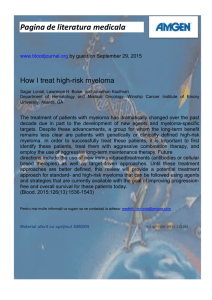
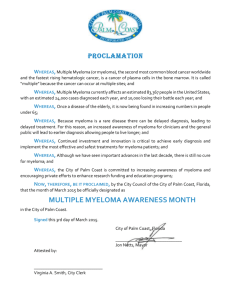
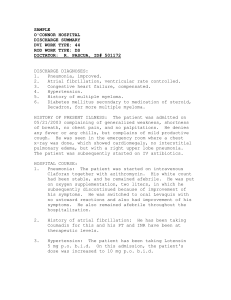
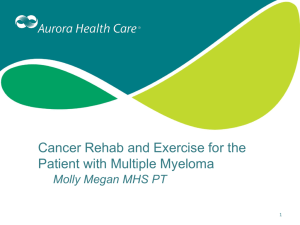
![-----Original Message----- From: [ ]](http://s2.studylib.net/store/data/015586927_1-21d1daf934fe9d4d4da65d90425973dc-300x300.png)
